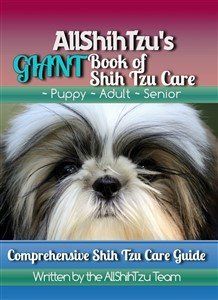Shih Tzu Breathing Problems
Overview
Breathing issues with Shih Tzu dogs, a brachycephalic breed, can be acute or chronic and are influenced by factors like weather and activity. These issues stem from their flat-faced structure, leading to compacted internal passages. While common in the breed, moderate to severe problems shouldn't be considered normal. Owners can often alleviate breathing difficulties, but veterinary intervention might be necessary in some cases.
This section will cover:
- Brachycephalic Airway Syndrome
- The main concerns: elongated soft palate, stenotic nares, and collapsed trachea
- Reverse sneezing and its breathing spasms
- Tips to improve your Shih Tzu's breathing
Brachycephalic Airway Syndrome
- Breathing difficulties (trouble catching the breath, etc.)
- Panting
- Trouble eating (gagging or regurgitating food)
- Snoring
- Noisy breathing (gasping, rattling, or wheezing noises)
- Coughing (‘regular’ coughing and/or honking noises)
- Exercise intolerance
- Cyanosis (low oxygen levels in the blood may cause gums to turn blue) (in very severe cases)
- Collapse, fainting (in very severe cases)
Elongated Soft Palate
- Newborn puppies may dribble milk from the nose when nursing
- Excessive panting
- Trouble eating (gagging or regurgitating food)
- Noisy breathing (gasping, rattling, or wheezing noises)
- Snoring
- Excessive saliva
- Symptoms may be more apparent during or after exercise or when excited
- Cyanosis (low oxygen levels in the blood may cause gums to turn blue) (in very severe cases)
- Collapse, fainting (in very severe cases)
- Worsening symptoms as a dog grows older
- In severe and extended cases, ligaments in the larynx may stretch, often to the point of collapse
Stenotic Nares
1. Immediate discontinuation of a collar. A collar should never be worn again; on leash (this is also recommended to prevent this issue). A harness will be used any time the Shih Tzu is on leash.
2. Limit over-excitement. Keep things low-key, offer introductions to fun activities in a casual manner.
3. Weight loss. Though this is not a problem that is typical of this breed, if your Shih Tzu is overweight, weight loss is recommended as even a few extra pounds can compound the problem.
Collapsed Trachea
- A distinctive cough, often referred to as a honking noise (like a goose) * This is the #1 sign and can be one of the most troubling symptoms. A dog may take a stance of extending his neck and spreading his elbows apart as if trying to cough something up.
- Noisy breathing (gasping, rattling, or wheezing noises)
- Gagging
- Breathing difficulties (trouble catching the breath, etc.)
- Exercise intolerance
- Symptoms may be more apparent during or after exercise, when excited, or when breathing in cold air
- Cyanosis (low oxygen levels in the blood may cause gums to turn blue) (in very severe cases)
- Collapse, fainting (in very severe cases)
1. Immediate discontinuation of a collar. A collar should never be worn again; a harness will be used when on leash (this is also recommended to help prevent this issue).
2. Limit exposure to cold air. Take care on below freezing days to limit outdoor activity.
3. Limit over-excitement. Keep things low-key, offer introductions to fun activities in a casual manner.
4. Avoidance of exercise during heat/humidity. Moderate to heavy activity in hot (and especially humid) weather can make breathing difficult; even more so for those with collapsed trachea. Follow general care tips to limit exercise during the hottest parts of summertime days.
5. Weight loss. Though this is not a problem that is typical of this breed, if your Shih Tzu is overweight, weight loss is recommended as even a few extra pounds can compound the problem.
Breathing Spasms- Reverse Sneezing
- Cupping your hand over the mouth and nose for 15-20 seconds to regulate carbon dioxide levels.
- Applying a dab of peanut butter on the dog's nose to prompt tongue extension, relaxing the throat.
- Gently massaging the throat with soft, downward strokes to relax it.
- Offering water or a snack to interrupt and stop the sneezing episode.
Allergies
Breathe Better Tips for All Shih Tzu Dogs
5) A collar can cause breathing issues in two ways: if too tight, it constricts the neck and breathing passages (a good fit allows two fingers under it), and if used with a leash, it stresses the neck, potentially interfering with breathing and risking tracheal injury. Always use a harness instead.
Best Interactive Toys for a Shih Tzu - Bored Shih Tzus can get into mischief fast, but the right toy can keep their minds sharp and tail wagging. These stay-busy picks are made to challenge, engage and entertain, offering real mental stimulation your sweetie will keep coming back to.
Shih Tzu Do's and Don'ts - A quick, super-helpful summary of the 3 most vital do's and the 3 most important don'ts when taking care of a Shih Tzu puppy or dog. It's always a good idea to reassess things, for optimal health and well-being.
Shih Tzu Sensitive Stomachs and Other Top Concerns - Addressing sensitive skin, tummy troubles, cold intolerance, breathing discomfort, and mobility issues in Shih Tzu dogs. Fast, effective remedies to help your Shih Tzu start feeling better today.

